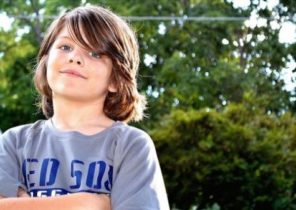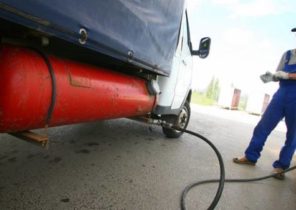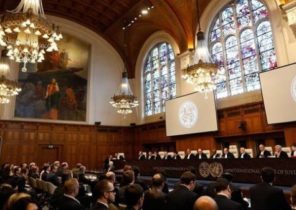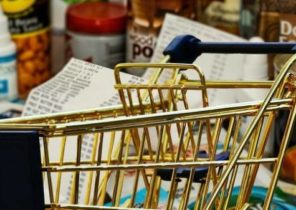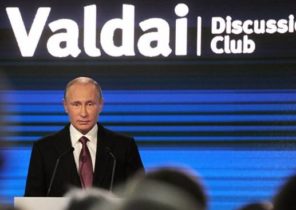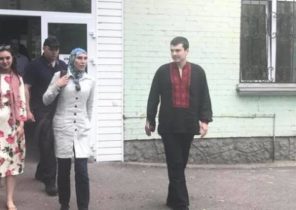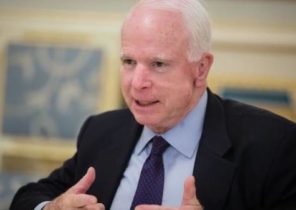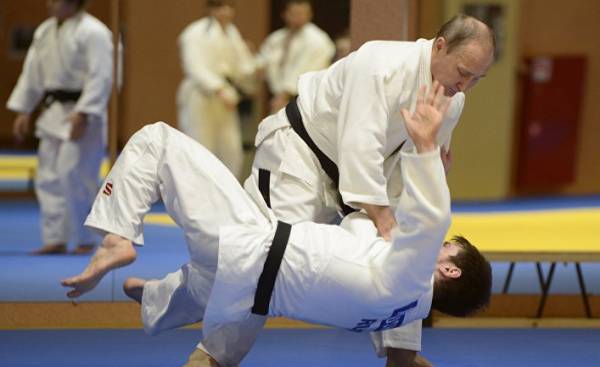
Vladimir Putin is one of the most powerful and most mysterious people in the world. We still can only guess about his real ambitions. But perhaps his difficult childhood in Leningrad will give us some clues. Here is the first of three chapters about Vladimir Putin, his path to power and the immediate environment.
Little stories about Vladimir Putin give so many food for thoughts as this story with the rat. It refers to Leningrad in his childhood Putin himself told in the “book-portrait” “first person”, which was published in Russian in March 2000, two weeks before he was first elected President of Russia.
“There, on the stairs, I realized that the phrase “cornered”. In the entrance of the lived rats. And my friends all the time chasing them with sticks. I once saw a huge rat and pursued until they drove her into a corner. She had nowhere to run. Then she turned around and jumped on me,” says Putin continued: “This was unexpected and very scary. Now the rat was chasing me. She jumps over the steps, jumped down the stairs. However, I was still faster and slammed the door in her nose.”
In the book, which consists mainly of heroic stories, this episode seems unusual, because here the reader understands that Putin may be afraid. But all ends well, and even here there is a hint that even then he was a “man” is a Russian concept that refers to man, whose image Putin has cultivated throughout his career. And this story can be interpreted as an allegory of an important component of the worldview of Putin: nothing good will come from attempts to drive Russia into a corner like this, from his point of view, trying to make the US and NATO since the collapse of the Soviet Union. Russia will win, take the initiative. The best defense is a good offense.
“50 years ago in the streets of Leningrad taught me: if a fight is inevitable, strike first,” said Putin 15 years later, in October 2015, at the annual meeting of your international discussion club “Valdai” in Sochi.
Hooligan, not a pioneer
Remarkable was Putin’s explanation that Russia has started to bomb Syria in order not to wait for the terror of the Islamic state (organization banned in Russia), will begin in Russia itself. And it also reflects the style of Russia’s actions in other areas. The annexation of Crimea as a response to the revolution in Kiev, ostensibly to prevent the emergence of NATO bases in the backyard of Russia. Military, political and economic support of separatists in Eastern Ukraine. Intense arms build-up and large-scale military exercises to instill a sense of respect. Hacker attacks, information campaigns and other attempts to influence the political agenda in the West, who was allegedly trying to undermine the rule of Putin and make Russia color revolution.
It’s a defensive action from the point of view of Putin and most Russians, but aggressive on the opinion of others.
The story of the rat shows and what was Vladimir Putin in childhood. “Hooligan, not a pioneer”, as it is written about him on its website of the Kremlin, with a mention of the pioneer movement — the children’s organization similar to boy scout, from the Almighty once the Communist party.
As evidenced by this short story, the man is the fourth consecutive year the American business magazine Forbes selects the most powerful man in the world, grew up in modest circumstances. Even in a very modest way.
Shared kitchen and toilet
The apartment in which he spent his childhood, was on the street Baskov 12, near the center of the city, which since 1991 is again called Saint Petersburg. It’s an old nondescript five-story brick building with peeling in many places, the pale yellow plaster.
On the first floor are the offices, for example, the office of the future leaders and several unions of combat sports that may seem a bit symbolic, considering that Putin has long and strongly interested in judo.
But much to the disappointment of young Chinese tourists, Yu, and Lilin is clearly nothing to indicate that here lived a Putin with his family, from his birth in October 1952 to the time when he was 25 years old and he enlisted for service in the Soviet intelligence service KGB.
The majority of tenants in the negative the question whether this building somehow with Putin. But uniformed security guard in the courtyard shows the Windows on the fifth floor, to the Chinese girls were able to photograph them.
These apartments have long been upgraded, but when there was a family of Putin, they had a room area of up to 20 meters — one of the three rooms of the so-called communal apartments, where several families shared a kitchen and toilet. The Elevator was not, there was no hot water, toilet, said Putin’s schoolteacher Vera Gurevich, was terrible, but in a small kitchen, where in one corner was a gas stove and the other with a sink, no Windows.
“It was a very poor family, in full accordance with the then Leningrad standards. Family workers only indirectly connected with the government. And they grew up the son who in his youth was a regular bully,” says historian and journalist Lev Lurie, who, among many other things, organizes excursions in Saint-Petersburg on the key places associated with the life of Putin in this city.
“In the Soviet system Putin and not come close to power. He laments the collapse of the Soviet Union from the geopolitical point of view, but without that crash, he would never have become President,” he says. Father, also named Vladimir, worked at the wagon factory in the city after he was seriously wounded during the Second world war. Mother, Mary, worked as a watchman, cleaned in kindergarten, soap tubes in the laboratory. In the courtyards of the street young Vladimir Baskov — for friends Volodya — last but not least learned to fight.
The mentality of a street fighter
Putin himself said that he grew in the backyard “according to the law of the jungle”, where you had to become the strongest. He was short and rather scrawny, but not shied away from fights with older and stronger boys, often to protect weaker friends. Later, he started practicing judo and very soon — even at the highest level, as he considers himself and others and took him off the street. But in adulthood, when he was a KGB officer, he was regularly involved in street fights.
“Putin has the mentality of a street fighter. Of course, he has many other qualities, and now he is not reckless people. But we must not underestimate how the years have affected his Outlook. Be a leader. Bay first. You have to fight to the last”, — says Dmitry Travin, Professor of Economics and political commentator from St. Petersburg.
The dream of becoming a KGB agent, appeared in Vladimir Putin’s 15-year-old. Together with friends he watched the popular Soviet film “Shield and sword”, loosely based on the spy novel. Several times. And after a while he, without consulting anyone came to the headquarters of the KGB in Leningrad, to learn what to do to it took the service.
Learn the law, read the answer. But it took another four years of study, before Putin, who managed almost to keep your spy dreams, contacted the intelligence services and offered him a job.
Calm spy post in Dresden
KGB hired him in 1975 to engage in counter-espionage and other intelligence activities in Leningrad, during which he, however, his superiors are not impressed. Behaving too risky, says one estimate. “Sullen and uncommunicative”, claimed another.
In 1980 he met the stewardess of “Aeroflot” Lyudmila Shkrebneva, in 1983, they married, and in 1985 appeared the first of two daughters. The couple divorced in 2014. But before long, Lyudmila Putin talked about his purposeful wife, who, at times, the charismatic, impenetrable, cold, and who became a sex symbol to many Russian women that he — “the vampire” and “freezer”.
When Vladimir Putin finally in August 1985, after 10 years of service, was sent to the GDR, and being 33 years old first left the Soviet Union, he was not in the “spy capital” of Berlin, a small branch of the KGB in Dresden.
Not all is known about his activities there, but I think it was mainly office work, and tasks included, for example, to get free tickets for the Soviet soldiers, so that they could watch match between Dynamo Dresden and visiting Spartak Moscow.
Putin has shown himself quick-witted and capable, he was a favorite of the chief of the local KGB and gradually moved through the ranks, but not particularly fast. When the Berlin wall fell, Putin was a KGB Lieutenant Colonel, which was quite commonplace for a man of his age and years of service.
His assignment overseas meant that Putin was away from the reforms since 1985, were held at home, in the Soviet Union, Mikhail Gorbachev. He was watching them from afar, as told by his colleagues and he, himself, skeptical about change. The fall of the Berlin wall in 1989 convinced him that houses in Moscow did not go as it should have been.
Homeland that has disappeared
Putin was a KGB officer of the highest rank of those who were present at that time in Dresden, when the crowds 5 Dec stormed the building of the local branch of the “Stasi” and then prepared to storm the building of the KGB. He forced them to change the intention of a reputable threat, “that his comrades are concerned, and they have permission to use weapons if necessary”. But when he called and asked for help from the Soviet military forces nearby, he received the answer that no aid will not be rendered without an order from Moscow.
“But Moscow is silent,” said his interlocutor on the phone.
“I had the feeling that the country is no more. It became clear that the Union is sick. And it’s a deadly, incurable disease called paralysis. The paralysis of power,” Putin said in the biographical book “first person”.
The feeling that the state is falling apart, intensified when he returned to the Soviet Union next year. He obtained a position in a small branch of the KGB in Moscow, but neither of the apartment, which usually has the right Colonel, no pay for three months he had received.
So he and his family moved back to Leningrad. And after the break, as the Vice-Dean of the University, Mr. Putin began to work on a new chosen people, the city Council and then mayor Anatoly Sobchak, who was formerly a University Professor, who taught him law.
Putin recommended that configured to reform KGB General Oleg Kalugin, but the secret service apparently had no part in this. The KGB had nothing against to have their man at Sobchak, and up to a failed coup attempt against Gorbachev in August 1991, Putin remained on the payroll of the KGB. But during the attempted coup in which the head of the KGB Vladimir Kryuchkov played a major role, Putin assured his new leader that the KGB, where he worked 16 years for him is gone.
He carried our bags
Leningrad once again became St. Petersburg. Portraits of Vladimir Lenin in the offices were replaced by portraits of Tsar Peter the Great, founder of the city. Sobchak, Putin laid the responsibility for relations with foreign countries.
Thus, Putin first came close to power in the face of high status, charismatic mayor, who was always foreign guests, although he abroad did not go. Putin himself, however, was not the man much notice. For Sobchak, he was a valuable employee, but completely invisible.
“He didn’t say much but was very friendly. He carried our bags and made sure we got comfortable,” — said Thorkil Simonsen (Thorkild Simonsen), former mayor of Aarhus city of St. Petersburg, about Putin, how he remembered it during his visit on the official ceremony of the change of the name of the city in November 1991.
After the collapse of the Soviet Union in December of the same year, Vladimir Putin has received a key role in large-scale process of privatization of the state-controlled economy. These were the years of chaos, in which some few Russians have become fabulously rich within a very short period of time. According to many sources, has improved the position of Putin himself, who was responsible for the exchange of metals, wood and other raw materials for food from overseas, which are not always reached the shelves.
In 1996, Sobchak lost the election for mayor, and Putin was again without a permanent job. He decided to leave his hometown and head for the capital, Moscow, where he touts St. Petersburg colleague Alexei Kudrin, who later became Finance Minister and Putin still acts as one of his closest advisers on the economy.
A quick way to the top
In Moscow, Putin was an outsider — as so many times before. But due to its ability effectively to solve problems and loyalty to the leadership, he quickly began climbing the corporate ladder. He became Deputy Manager of the President and dealt with the Russian foreign property. Later he was Deputy head of the presidential administration of Boris Yeltsin. In 1998 he became head of the FSB, the organization that replaced the KGB. And in August 1999, being still unknown to most Russians, became Prime Minister under Yeltsin.
It’s unclear what forced Yeltsin to appoint Putin as his last Prime Minister. Billionaire Boris Berezovsky, who, like several other oligarchs, soon fell out of favor with Putin, played an apparently key role. The FSB, whose influence again increased, probably also had a hand in this.
When there is a long history of Yeltsin announced his resignation on 31 December 1999, Vladimir Putin suddenly became acting President of Russia. A position he cemented his victory in the elections in March 2000, and which since then has maintained — except for the period 2008 — 2012 when he formally handed over responsibilities to Dmitry Medvedev, and he became the head of the government, but really all this time, Putin remained number one.
Two years before the transfer of power to Putin on its website has published what will later be known as his “Manifest of the Millennium”. Their value system at that time Putin stated carefully and fairly liberal, but even then he formulated a number of ideas on which he then based his rule.
The Greatness Of Russia. Russia as something very special, and your civilization. Traditional values. Patriotism. The strong state. Putin himself — a statesman, a man who simultaneously serves as the state and building it.
“Russia was and will remain a great country. This is due to the inseparable characteristics of its geopolitical, economic, and cultural existence. They determined the mentality of Russians and the policy of the state throughout Russian history. Can not determine now,” wrote Putin.
“Russia will not soon become, if ever, will become the second edition of, say, the US or England, where liberal values have deep historical traditions. We have a state, its institutes and structures have always played a vital role in the life of the country people,” he said.
Personal and political transformation
Putin then could not be characterized as an enemy of the West. In an interview for the BBC, taken just before the election in 2000, he argued that Russia is part of European culture. He can’t imagine Russia “isolated from Europe and what we often call the civilized world.” He does not consider NATO an enemy, and it is quite possible that Russia will become a member of the military Alliance, “if Russia’s interests will be considered if it will be a full partner.”
However, this did not happen. No matter whose fault, the developments led to the fact that relations between Moscow and the West is now colder than ever since the mid-1980s- in any case, if Donald trump not dramatically change course.
Before joining Putin’s office was the first extension of NATO to the East in 1999 year, there was a war in Kosovo and the bombing of Yugoslavia. Then Putin in 2000-m to year crushed the attempt of Chechnya to secede. The United States initiated the war in Iraq in 2003-m to year. Another expansion of NATO in 2004-m to year. The orange revolution in Ukraine in 2004-2005. The war between Russia and Georgia in 2008. NATO bombing in Libya in 2011. The Maidan in Ukraine in 2014. Russia annexed Crimea and began supporting separatists in the same year. The war in Syria.
During this period, with Putin, there was a gradual change — both personal and political.
From a humble man who preferred to keep a low profile in his first presidential period seemed to be uncertain and not too well known, he turned into a confident social person with a good speech. He appears on Russian television almost every day. He spends hours-long sessions with journalists and people, during which he answers all possible questions. He plays the role of the macho, although recently more have appeared on the hockey field than a horse with a bare torso.
With regard to domestic policy, his “vertical power” becomes more and more unlimited, the language — ideologically conservative, and the suppression of civil society — all the more blatant. The opposition is persecuted — and in some cases even killed, and the criminals never found. NGOs proclaimed “foreign agents”. The number of independent media outlets is decreasing.
A man with a mission
In the foreign policy arena Putin has unequivocally signaled that Russia does not accept a subordinate role.
“The first decade of Putin’s presidency was marked by pragmatism. He now is in many ways pragmatic, but much has changed,” said Dmitry Trenin, Director of Moscow analytical center Carnegie in the analysis for information and news magazine Politico.
“Today, Putin shows that he has a historic mission. This mission is to restore what he believes to be rightfully owned by Russia’s position as one of the world’s great powers,” writes Trenin and identifies several conditions that are necessary to accomplish this mission:
“Relying on traditional values with the Orthodox Church headed. The revival of Russian patriotism aimed at a strong state. The superstructure of the nation. Integration of Russian, Belarusians and Ukrainians into a single “civilizational Union” in the center of Eurasia in Alliance with the Muslim, ethnically Turkic peoples of the region. And protection of strategic independence of Russia from its geopolitical rivals, primarily from the US and the EU.
Where this mission can make, we can only guess.
Whether Putin, despite his assurances to the contrary, imperialist ambitions, in which the Crimea and Russian-backed separatist Republic in Ukraine, Georgia and Moldova — the first step of attack on the West? Or he’s just like that rat in the street singer-12, goes on the attack, only being pushed into a corner?
